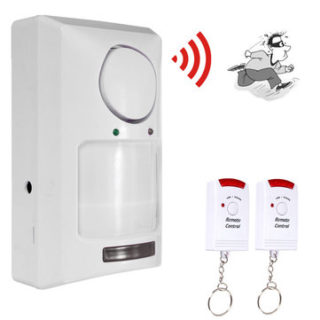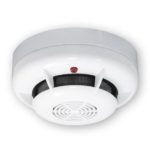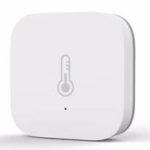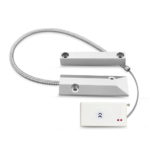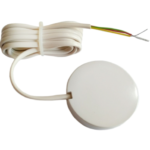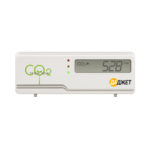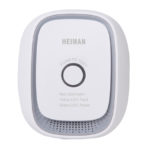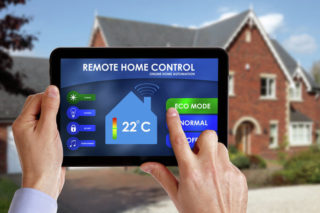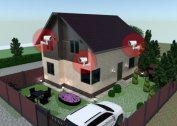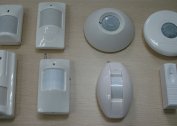The Smart Home system is an automated network consisting of individual devices and devices, each of which is responsible for solving any domestic or business problems. As a rule, the ideology of controlling such a system uses modern technology of distributed intelligence. It does not require a host computer that controls the operation of the entire system, because each of its nodes has its own intelligence. Receiving information from sensors located throughout the house, such a node quickly processes it and generates control signals, which then enter the actuators. If you integrate them into a single centralized network, the sensors are controlled from a common centralized remote control for all devices.
Sensors for the Smart Home system
Sensors are one of the important elements of an intelligent system. Many of them are able to work offline and do not require integration into a single network.
Movements
Motion sensors are most often used when you need to automatically turn on and off the light. A movement was recorded - the light turned on, no movement - turned off. They are installed in the utility rooms, bathrooms and corridors, in the courtyard - here, when motion is detected, the spotlight will turn on. The devices are also used in security systems - if movement is detected in a security room, the sensor will notify the homeowner or transmit a signal to the security control panel.
DD are wall and ceiling. To turn the light on and off, use the wall-mounted version. If the sensor is integrated into the security system, it is better to purchase a ceiling version with a 360 ° view.
Temperature
The temperature sensor transmits the necessary data for Smart Home systems with climate control. They are connected to the system along with heating devices, air conditioning and the “Warm floor” subsystem. With their help, you can maintain the desired temperature in all residential premises.
Also, temperature sensors are used for automatic heating of street steps, courtyards, etc.
Lighting
Lighting sensors work, as a rule, in lighting systems of local areas (turn on lights when dark and turn them off at dawn), when organizing facade and landscape light. In the room they are used, for example, to shutter windows and turn on lights in the evening.
Fire (smoke)
It is recommended to install a smoke detector in each living room. When smoke appears, it emits a sound signal, thereby attracting the attention of people in the house. If the fire detector is connected to the security system, it will send an alarm signal to the dispatcher's control panel and turn on the fire extinguishing and smoke removal systems, turn off the power to the house and turn off the gas. A sensor equipped with a GSM module will notify the owner of an emergency, by sending the latter an appropriate SMS.
- Light sensor
- Fire fighting
- Temperature
Magnetic contact (reed switch)
Reed switches are widely used in smart home security systems. Install them on doors, windows, gates, etc. The principle of their operation is simple: in the normal state, the sensor contacts are closed, when the contacts open, an alarm is triggered.
Reed switches integrated into the centralized network of a smart home help save energy. For example, if the room has an air conditioner and the window is open, the reed switch will turn off the air conditioner and turn it on only after the window is closed. In winter, if doors and windows are open, the reed switch will turn off the heating.
Leaks
The leakage sensor is a small device (5x5 cm), which is placed a few millimeters from the floor or completely on the floor near the washing machine, under the heating battery and in other places where water leakage is possible. If liquid gets on it, the owner will be notified by a sound or light signal.
By connecting such a sensor to the Smart Home network, which has a controller and valves that shut off the water supply, the problem will be solved without the presence of a homeowner. The system will send an SMS about an emergency to the owner and dispatcher of the company serving the house.
- Reed switch
- Leak sensor
Additional detectors
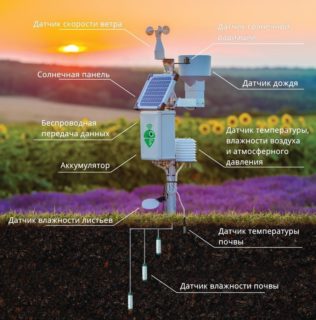 There are a number of devices that are responsible for the technical safety of the house, utility rooms and the adjacent area.
There are a number of devices that are responsible for the technical safety of the house, utility rooms and the adjacent area.
- The CO2 sensor is installed in garages, boiler rooms and in houses equipped with air purification systems.
- The household gas sensor monitors the level of methane in the apartment and, if there is its maximum concentration, it shuts off the gas.
- Sensors of rain, wind and soil moisture are used to monitor the garden. They will monitor the amount of moisture in the ground and, if necessary, include watering the plants. In addition, the system, having received a signal about the approaching rain, will close open windows and send a corresponding message to the homeowner.
- CO2 sensor
- Gas leakage sensor
Installation, installation and adjustment of sensors must be carried out in accordance with the instructions attached to them. Only in this case will their work be efficient and reliable.
Producers of sensors and software for their configuration
 The domestic market offers potential buyers smart sensors from well-known manufacturers:
The domestic market offers potential buyers smart sensors from well-known manufacturers:
- Hank;
- Philio
- MCO Home;
- Neo Coolcam et al.
All of them differ in miniature dimensions, which makes it possible to place them in residential premises almost imperceptibly. Fastening is carried out using a screw or double-sided tape.
Devices are:
- analogue;
- wireless
- multifunctional.
To configure the detectors and manage them as part of the Smart Home system, specialized software (software) is used:
- Major DoMo;
- Home Sapiens;
- Smart home 1.0;
- DIVISION Constructor et al.
All actuators of the Smart Home system and household appliances connected to it are turned on and perform the functions assigned to them upon receipt of certain commands. The set of such commands is called a script and is programmed separately. This procedure usually takes a lot of time and requires special attention, because the efficiency of the entire system depends on its quality.
